- Home
- Marie Ferrarella
A Billionaire and a Baby Page 8
A Billionaire and a Baby Read online
Page 8
She looked at them, lightning striking her brain and activating it. “Car keys. Oh God, the car—”
She looked so worried he was quick to set her at ease. “You were right, there was something wrong with it. I had it fixed and then had someone drive it down to your place.”
Her place. She stopped taking baby steps and looked at him. “You know where I live?”
“I know everything.”
She resumed walking. The man was coming across like a regular Renaissance man. “Delivering babies, flying helicopters, fixing cars, detective. I’m beginning to believe that you do.”
He didn’t want her making too much of it. It was all just common sense. “I believe in being prepared for all contingencies.”
“Apparently.” She stopped before the door marked 512. “This is my room.”
His mouth curved in a half smile. “Yes, I know.”
“Sorry, I forgot for a minute.” She leaned against it rather than turn the door latch. The door gave, opening. “You know everything.”
The quip died on her lips as she walked into the room. There was a large, cut-glass vase on her table, filled with a dozen of the reddest long-stem roses she’d ever seen. There were flowers in her room, several arrangements from family and friends. Even Owen had sent a basket. But nothing like this.
The roses took her breath away. “Did I forget those at your cabin, too?”
He regarded her guardedly. Was that just a slip, or was she baiting him? “It’s not my cabin, it belongs to John Fletcher and no, you didn’t. I don’t like showing up empty-handed when I go somewhere.”
“You brought the purse,” she reminded him, tongue in cheek. She noticed something else just behind the vase. “And a football.” Sherry looked at him. “I’m afraid you’re going to have to wait a few days before I’m up to playing.”
He brought her to the edge of her bed. She sank down gratefully. “It’s for your son.”
Yesterday came back to her, at least a fragment of it did. “That’s right, the football metaphor. You being the wide receiver.” She beamed, proud of herself for remembering.
“I wasn’t sure you heard that.”
“I heard everything, I just couldn’t assimilate it all until later.” Sitting down now, she felt almost human again.
“As I recall, you were a little indisposed at the time.” He watched her toe off her slippers one at a time.
“Just a little,” she agreed. And then she turned somber. What she couldn’t remember was whether or not she’d expressed her gratitude. “Look, I don’t know how to thank you. Nothing seems good enough.”
He hadn’t done it for the thanks, she’d been in need of help. He would have done the same for Greta. Faster, probably. But if she was really serious, he had a way for her to express her gratitude. “I think something will occur to you.”
He was talking about the story, she thought. She really wasn’t at liberty to tell him that she wouldn’t pursue the story, that, if anything, his actions had aroused her curiosity. She wanted to know more about the man who was a ruthless businessman by day and a rescuing Renaissance man by night.
“What does occur to me right now is that you have got to be possibly the most well-rounded person I have ever met.”
Flattery turned him off. He’d suffered too much of being pandered to by people who were stupid enough to believe that flattery made a difference in the way he viewed things, or them.
“Like I said, I like being prepared.”
“There’s prepared and then there’s prepared.” She studied him in silence for a moment. “Is there anything you can’t do?”
He looked her in the eye. “I can’t seem to get you to stop asking questions.”
He didn’t look annoyed, she thought. Progress. “Occupational hazard.”
She still looked pale, he thought. “How are you feeling?”
She thought of her sore bottom. Stretching was definitely out. “Well, I don’t think I’ll be doing any intricate yoga positions for a couple of weeks, but all things considered, I’m doing great.” Her smile deepened as she looked up at him. “If you hadn’t been there for us—”
He shrugged off her words before she could finish. “Someone else would have.”
He was really sincere about that, she realized. One of the richest men in the country resisted compliments and gratitude. Amazing. “I guess I should add modesty to that list.”
That did make him laugh, however briefly. “There’d be a lot of people who’d dispute that with you.”
She liked the sound of his laugh. Deep, rich, like the first coffee in the morning. “They’d be wrong.”
He rubbed his chin, regarding her. She didn’t seem the pandering sort. “I don’t give way before flattery, Ms. Campbell.”
“And I’m not trying to flatter, Mr. Adair.” Her expression softened. “I think after everything we’ve been through, we don’t need to be that formal.”
It was time for him to leave, he decided. He’d already been here too long. He’d only meant to leave her purse and the gifts. Discovering the room empty should have been a godsend. But something had urged him on to see how the baby was doing, and then he’d found himself compelled to comment once he’d seen the reflection of her face in the glass.
“Yes, we do. Well, now that you have your purse and your keys—”
She smiled, nodding at the vase. “And my roses.”
“And your roses,” he allowed, already withdrawing, “I’d better go.”
Suddenly she didn’t want him to leave. Not because he was her story, but because he was the man who’d come to her aid. Whether he liked it or not they’d bonded, up in that cabin.
“You could stay. We could talk. Off the record,” she added for good measure.
Sin-Jin looked at her pointedly. “This has all been off the record,” he informed her. “And I have a meeting to get to.”
Still on the edge of the bed, she tried to scoot back and wasn’t very successful at it. And then, before she knew it, Adair had placed his hands on her waist and moved her back. Before she could say anything, he threw the blanket over her legs, covering her.
“What are you smiling about?” he asked.
She wiggled out of her robe. Aware that her nightgown was slipping from her shoulder, she pulled the strap back up. “I was just thinking that you’re not nearly the coldhearted man you want the general public to think you are.”
He felt something stir in his gut as he looked at her. “I don’t care what anyone thinks, Ms. Campbell. And I am a coldhearted man. The general public is right.”
She inclined her head, knowing better but too tired to argue. “Have it your way.”
“I generally do, Ms. Campbell, I generally do. You’ll forgive me if I don’t say, ‘See you around.”’
“You don’t have to say it,” she told him as he began to leave. “Some things are a given.”
She had the pleasure of seeing him stop for a fraction of a second before continuing on his way out. For that fraction of a second she knew she’d gotten to him. Which was only fair. Because the feeling was mutual.
Chapter Seven
“What do you mean, ‘The bill’s already been taken care of’?”
Sherry wasn’t in the mood to untangle someone else’s bureaucratic mistakes. After a three-day stay at the hospital, she was finally going home. Going home without her baby. The infant was still not ready to leave the shelter of the incubator and monitors that watched over him. Sherry was having a great deal of trouble coming to terms with that.
Standing beside the wheelchair that hospital regulations dictated she use to make her exit, and buffered on either side by her parents, Sherry looked at the older woman at the cashier’s desk.
The woman smiled at her brightly. “Just that, it’s been taken care of.”
Had she missed something? Sherry tried to remember. No, there was some mistake. “But that’s not possible. I haven’t even given you my insurance card.” She h
eld it aloft for the woman’s benefit.
In the confusion of her emergency entrance, she’d just assumed that no one had thought to take her insurance information. It seemed rather odd to her, given what hospital expenses were these days, but she wanted to rectify the situation before she was discharged.
But when she’d stopped the nurse pushing her wheelchair from taking her outside so that she could provide the necessary information, the billing clerk had politely but firmly refused to take it down because apparently there was no need.
Connor Campbell gently edged his daughter aside as he leaned over the desk. A short bull of a man with a thick mane of white hair, he had a presence that immediately gave him center stage. He smiled encouragingly at the clerk.
“There must be some mistake. Maybe you have my daughter mixed up with another Campbell. It’s a common enough name.”
With a patient smile the woman retreated to her computer and reentered Sherry’s information. The same screen came up a second time. She shook her head and raised her eyes to Connor. “Nope, says right here, ‘Paid in full.”’
Connor frowned. “Never heard of an insurance company being eager to pay out on a claim, especially before the claim’s been made.”
The woman looked up at him brightly. “Payment didn’t come from an insurance company.” She looked back at the screen to double-check before she continued. “It’s a voucher from Adair Industries.”
Sherry’s mouth dropped open. “What?”
Without waiting for an invitation, Sherry pushed aside the wheelchair and came around to the other side of the woman’s desk to look at the screen herself.
Stunned, the clerk began to protest. “Ma’am, you can’t just—”
Sherry was in no mood for opposition. “Yes, I can ‘just’ when it concerns my bill.” Amazed, vaguely annoyed, she read the notation on the screen. The woman had been right. “Son of a gun,” she whispered, stunned. The payment was coming from Adair Industries all right. Which meant the money was somehow coming from Adair.
Why?
Connor raised a bemused, shaggy eyebrow as he fixed his daughter with a quizzical look. “Just what kind of secrets did you promise to bury for this man?”
Her head jerked up. She knew her father was kidding, but deception of any kind was a sore point for her. Drew had deceived her when he’d made her believe that he loved her, that there were no other women in his life. Instead the man was probably just one female short of a harem.
“None,” she told him tersely. “I didn’t promise to bury any secrets.” And then, because it was her father, her voice softened. “He never told me any secrets.”
No man was prouder of his daughter than Connor Campbell. He’d stake his reputation on her honor. Connor exchanged glances with his wife as if to wonder if there was something going on between Sherry and this man?
“Then why’s he being so generous?” Connor asked.
Sherry sighed, shoulders rising and falling in a helpless shrug. “I don’t know.”
Her mother had what to her was a plausible explanation. “Could be the man’s just got a good heart. Well, it’s possible,” she insisted when both her daughter and her husband looked at her as if she’d suddenly lost her mind.
Connor pressed his lips together as he shook his head. “Oh, Sheila, if you only read the paper once in a while instead of using it to wrap things with, you’d know the man’s a cold devil.”
The petite, trim woman remained undaunted. “Even the devil’s got some good in him if you look hard enough.”
To which Connor shook his head. “Incorrigible. You’d think after being on this earth for—” his wife shot him a warning look “—twenty-nine plus years,” he said carefully, “she’d know that the world isn’t a big sunny garden.”
The soft Irish lilt in Sheila’s voice became more pronounced whenever she grew adamant. “You only see the dark side, Connor, my love. I choose to see the light. I think of the two of us, I’m the happier one.”
Sherry frowned. “Well, I don’t care what color St. John Adair sees, there’s no way I’m going to let him pay my bills for me.” Coming around to the other side of the desk again, she slid her insurance card across the counter toward the woman. “Here, contact my insurance company for actual payment of the account.”
The woman shook her head. “The hospital will only wind up sending it on to you.” The woman gently pushed the card back to Sherry. “We can’t collect twice on the same account.”
Temporarily stymied, Sherry refused to give up entirely. “But you’ll need the information for my son’s bill. He’s still in the neonatal section.”
The woman typed in “Campbell, Infant,” then looked up at Sherry. She hesitated slightly before saying, “It seems that bill’s covered, too.”
That really didn’t make any sense. “But the charges are still coming in.” The doctors had told her that her son was going to have to remain here at least a week, if not two.
The woman took a deep breath, then launched into the explanation. “There’s a voucher attached to the account. All expenses will be paid by—”
Sherry closed her eyes as she echoed the clerk’s next words. “Adair Industries.”
Connor snorted, then slipped his arm around his daughter. “Maybe helping you deliver the baby was like a religious experience for him,” he offered. When she looked at him, Connor punctuated his guess with a wide shrug.
Sherry didn’t know what to say, what to make of it. This act of so-called generosity was entirely against type. Although now that she thought about it, she really didn’t know what “type” Adair was. She had only hearsay to act on, and that wasn’t very satisfying. Up close and personal, the man certainly didn’t fit into any mold that she knew of. It wasn’t as if he was fearful of the press or exposure, he just didn’t like the media. Not all that unusual, really.
There had to be a catch, but what?
Behind her the nurse who had volunteered to usher her out shifted. She was still holding on to the wheelchair. “I need to get back to my floor,” she prodded gently. “Could we get you to your dad’s car?”
Relieved that the discussion was tabled for the time being, Connor responded quickly.
“Sure thing.” He patted Sherry’s hand. “We’ll get to the bottom of this, don’t you worry, but first things first. I’ll bring it round to the entrance,” he told the nurse, then turned to his wife. “Coming, Grandma?”
Sheila Mckinney Campbell drew herself up to her full five feet, squaring her shoulders defiantly as she fixed her husband with a dark look. “I’ll wait right here with Sherry, and I’ll thank you not to call me that, Connor.”
Connor only laughed as he hurried off to fetch his vehicle.
Sherry sighed, pocketing her insurance card. There was nothing more to be done here today. Bracing her hands on both armrests, she sank down in the wheelchair again and allowed herself to be taken down the long corridor.
“You know he’s just doing it to get to you, Mom.” She tried not to notice the baby items that were displayed in the window as they passed the gift shop.
“I know that.” Sheila patted her daughter’s hand as she walked alongside the wheelchair. “I love the baby, I truly do. It’s just that I don’t think I’m quite ready to be called—” she took a deep breath “—that name yet.”
Sherry glanced at her mother. With her flawless Irish skin and her red hair that still required no assistance from any chemical product on the market, Sheila Campbell looked more like her older sister than her mother. She could understand her mother’s ambivalent feelings.
“Work something out soon, Mom. I don’t want him growing up saying ‘hey you’ every time he wants your attention.”
Sheila nodded, her red hair bobbing about her face in lively waves. “Let me think about it a little more,” she murmured.
Sherry barely heard her. Her mind was elsewhere. Like a dog with a bone, she was trying to break it down into manageable pieces. Why was Adair
doing this? What was in it for him?
The puzzle helped to keep her mind off the fact that she was leaving her son behind.
“He’s doing very well.” Moving softly, the evening shift nurse came up and stood behind her as Sherry sat with her baby, rocking in a chair the hospital provided. “If he keeps on this way, you’ll be able to take him home in another week.”
Another week. It felt as if an eternity had already gone by, even though it was only a matter of a few days since she had left the hospital. As she was still unable to drive safely, her parents and friends took turns bringing her to the hospital, where she remained a few hours at a time, bonding with her son. Praying. Looking forward to the day she could be around him for more than a few revolutions of the hour hand.
“That’s good.” Sherry bent over and kissed the tiny hand that splayed out over her palm. The baby stirred, filling her heart to maximum capacity.
“I want you home, little one.”
“I know. I bet your brother’ll be happy to hear that.”
Sherry looked up at the woman, confused. She was an only child. “My brother?”
“Yes.” The nurse paused to beam down at the infant in his mother’s arms. “He’s been stopping by here late every night. It’s past visiting hours, really,” she confided to Sherry, “but he persuaded one of the other nurses to let him in for a few minutes. Wish my brother was that attentive to my kids. I can’t get him to even remember their birthdays.”
It couldn’t be Rusty or Owen because both had told her about their visits. “Are you sure there isn’t some mistake? I don’t have a brother.”
The woman looked at her, surprised and confused. “Tall, quiet, really good-looking.” A small sigh escaped the nurse.
It had to be Adair. “Does he say why he’s here?”
“Well, sure. To see how his nephew’s doing. That’s what he told Doris,” the nurse added, mentioning one of the nurses on the night shift.
For the past few days, Sherry’s professional life had taken a back seat to her private one. She was busy trying to return to normal, and spent what time she had visiting her son. But this thing with Adair was turning into a mystery. Maybe it was time to take the reporter in her off hold. “What time does he come by?”

 Colton Baby Conspiracy (The Coltons 0f Mustang Valley Book 1)
Colton Baby Conspiracy (The Coltons 0f Mustang Valley Book 1) Cowboy's Rescue (Colton 911 Book 1)
Cowboy's Rescue (Colton 911 Book 1) Bridesmaid For Hire (Matchmaking Mamas Book 23)
Bridesmaid For Hire (Matchmaking Mamas Book 23) Secrets of Forever
Secrets of Forever Fortune's Greatest Risk (The Fortunes 0f Texas: Rambling Rose Book 4)
Fortune's Greatest Risk (The Fortunes 0f Texas: Rambling Rose Book 4) Cavanaugh Cowboy
Cavanaugh Cowboy Colton 911: Secret Defender
Colton 911: Secret Defender Cavanaugh Stakeout
Cavanaugh Stakeout The Late Bloomer's Road to Love
The Late Bloomer's Road to Love Colton 911--The Secret Network
Colton 911--The Secret Network An Unexpected Father
An Unexpected Father The Lawman's Romance Lesson (Forever, Tx. Series Book 20)
The Lawman's Romance Lesson (Forever, Tx. Series Book 20) Coming to a Crossroads
Coming to a Crossroads Colton 911: Cowboy's Rescue
Colton 911: Cowboy's Rescue Summer of Love
Summer of Love Cavanaugh Stakeout (Cavanaugh Justice Book 41)
Cavanaugh Stakeout (Cavanaugh Justice Book 41) Texan Seeks Fortune
Texan Seeks Fortune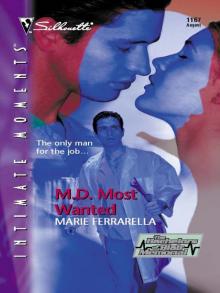 M.D. Most Wanted
M.D. Most Wanted Cavanaugh In Plain Sight (Cavanaugh Justice Book 42)
Cavanaugh In Plain Sight (Cavanaugh Justice Book 42) The Law and Ginny Marlow
The Law and Ginny Marlow Bridesmaid for Hire
Bridesmaid for Hire A Match for the Doctor
A Match for the Doctor The Sheriff’s Christmas Surprise
The Sheriff’s Christmas Surprise Colton's Secret Service
Colton's Secret Service A WEDDING FOR CHRISTMAS
A WEDDING FOR CHRISTMAS A Cavanaugh Christmas
A Cavanaugh Christmas Cavanaugh Fortune
Cavanaugh Fortune The 39-Year-Old Virgin
The 39-Year-Old Virgin Coming To A Crossroads (Matchmaking Mamas Book 24)
Coming To A Crossroads (Matchmaking Mamas Book 24) Cavanaugh's Missing Person
Cavanaugh's Missing Person Cavanaugh on Call
Cavanaugh on Call The M.D.'s Surprise Family
The M.D.'s Surprise Family Angus's Lost Lady
Angus's Lost Lady Her Red-Carpet Romance
Her Red-Carpet Romance Choices (A Woman's Life)
Choices (A Woman's Life) Prescription for Romance
Prescription for Romance A Perfectly Imperfect Match (Matchmaking Mamas)
A Perfectly Imperfect Match (Matchmaking Mamas)![[Kate's Boys 04] - Travis's Appeal Read online](http://i1.bookreadfree.com/i/03/21/kates_boys_04_-_traviss_appeal_preview.jpg) [Kate's Boys 04] - Travis's Appeal
[Kate's Boys 04] - Travis's Appeal Secret Agent Affair
Secret Agent Affair The Cowboy's Lesson in Love
The Cowboy's Lesson in Love Colton Copycat Killer
Colton Copycat Killer A Small Fortune
A Small Fortune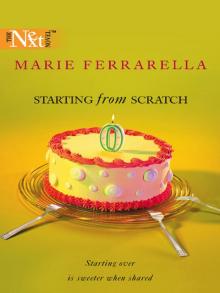 Starting from Scratch
Starting from Scratch Her Forever Cowboy
Her Forever Cowboy Colton Showdown
Colton Showdown Crime and Passion
Crime and Passion The Heart of a Ruler
The Heart of a Ruler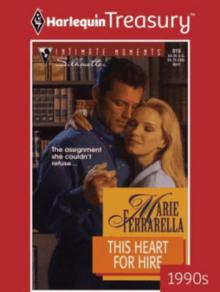 This Heart for Hire
This Heart for Hire A Forever Kind of Hero
A Forever Kind of Hero Special Agent's Perfect Cover
Special Agent's Perfect Cover The Baby Beneath the Mistletoe
The Baby Beneath the Mistletoe A Maverick and a Half
A Maverick and a Half The Doctor's Guardian
The Doctor's Guardian Cavanaugh Undercover
Cavanaugh Undercover Hero for Hire
Hero for Hire Fortune's Heirs: Reunion
Fortune's Heirs: Reunion How to Seduce a Cavanaugh
How to Seduce a Cavanaugh The Heiress’s 2-Week Affair
The Heiress’s 2-Week Affair Twice a Hero, Always Her Man
Twice a Hero, Always Her Man My Spy
My Spy An Engagement for Two
An Engagement for Two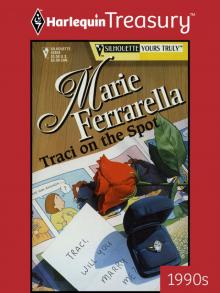 Traci On The Spot
Traci On The Spot Carrying His Secret
Carrying His Secret In Broad Daylight
In Broad Daylight Cavanaugh Cold Case
Cavanaugh Cold Case In Graywolf’s Hands
In Graywolf’s Hands The Baby Mission
The Baby Mission Real Vintage Maverick
Real Vintage Maverick Twins on the Doorstep
Twins on the Doorstep Cowboys Are For Loving
Cowboys Are For Loving Heart of a Hero
Heart of a Hero The Cowboy's Christmas Surprise
The Cowboy's Christmas Surprise Cavanaugh’s Woman
Cavanaugh’s Woman Sundays Are for Murder
Sundays Are for Murder Mission: Cavanaugh Baby
Mission: Cavanaugh Baby Cavanaugh Strong
Cavanaugh Strong Wish Upon a Matchmaker
Wish Upon a Matchmaker Dangerous Games
Dangerous Games What the Single Dad Wants...
What the Single Dad Wants... Rough Around the Edges
Rough Around the Edges Cavanaugh Judgment
Cavanaugh Judgment Cavanaugh Watch
Cavanaugh Watch Cavanaugh's Secret Delivery
Cavanaugh's Secret Delivery The Pregnant Colton Bride
The Pregnant Colton Bride Let's Get Mommy Married
Let's Get Mommy Married Searching for Cate
Searching for Cate A Forever Christmas
A Forever Christmas Dangerous Disguise
Dangerous Disguise Mac’s Bedside Manner
Mac’s Bedside Manner Cavanaugh Pride
Cavanaugh Pride The Fortune Most Likely To...
The Fortune Most Likely To... Internal Affair
Internal Affair A Second Chance for the Single Dad
A Second Chance for the Single Dad The Cavanaugh Code
The Cavanaugh Code Sapphire and Shadow (A Woman's Life)
Sapphire and Shadow (A Woman's Life) Her Lawman on Call
Her Lawman on Call A Dad At Last
A Dad At Last Her Right-Hand Cowboy (Forever, Tx Series Book 21)
Her Right-Hand Cowboy (Forever, Tx Series Book 21) Cavanaugh Heat
Cavanaugh Heat![[Ladera by the Sea 01] - A Wedding for Christmas Read online](http://i1.bookreadfree.com/i1/03/27/ladera_by_the_sea_01_-_a_wedding_for_christmas_preview.jpg) [Ladera by the Sea 01] - A Wedding for Christmas
[Ladera by the Sea 01] - A Wedding for Christmas Lassoing the Deputy
Lassoing the Deputy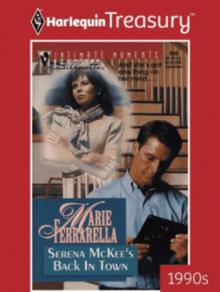 Serena Mckee's Back In Town
Serena Mckee's Back In Town A Baby on the Ranch: A Baby on the RanchRamona and the Renegade
A Baby on the Ranch: A Baby on the RanchRamona and the Renegade One Plus One Makes Marriage
One Plus One Makes Marriage Protecting His Witness
Protecting His Witness Cavanaugh Standoff
Cavanaugh Standoff The Baby Came C.O.D.
The Baby Came C.O.D. The Setup
The Setup Texas Rose
Texas Rose Three Marie Ferrarella Romances Box Set One
Three Marie Ferrarella Romances Box Set One The Lawman's Romance Lesson
The Lawman's Romance Lesson Desperately Seeking Twin...
Desperately Seeking Twin... Once a Father
Once a Father![[The Sons of Lily Moreau 02] - Taming the Playboy Read online](http://i1.bookreadfree.com/i/03/25/the_sons_of_lily_moreau_02_-_taming_the_playboy_preview.jpg) [The Sons of Lily Moreau 02] - Taming the Playboy
[The Sons of Lily Moreau 02] - Taming the Playboy Lily and the Lawman
Lily and the Lawman Cavanaugh's Surrender
Cavanaugh's Surrender The Cowboy and the Lady
The Cowboy and the Lady Innkeeper's Daughter
Innkeeper's Daughter A Bachelor and a Baby
A Bachelor and a Baby![[The Sons of Lily Moreau 03] - Capturing the Millionaire Read online](http://i1.bookreadfree.com/i1/03/31/the_sons_of_lily_moreau_03_-_capturing_the_millionaire_preview.jpg) [The Sons of Lily Moreau 03] - Capturing the Millionaire
[The Sons of Lily Moreau 03] - Capturing the Millionaire Because a Husband Is Forever
Because a Husband Is Forever Diamond in the Rough
Diamond in the Rough The Doctor's Forever Family
The Doctor's Forever Family A Lawman for Christmas
A Lawman for Christmas Cavanaugh Rules: Cavanaugh RulesCavanaugh Reunion
Cavanaugh Rules: Cavanaugh RulesCavanaugh Reunion Baby Times Two
Baby Times Two![[The Sons of Lily Moreau 01] - Remodeling the Bachelor Read online](http://i1.bookreadfree.com/i1/04/02/the_sons_of_lily_moreau_01_-_remodeling_the_bachelor_preview.jpg) [The Sons of Lily Moreau 01] - Remodeling the Bachelor
[The Sons of Lily Moreau 01] - Remodeling the Bachelor The Colton Ransom
The Colton Ransom Mendoza's Secret Fortune
Mendoza's Secret Fortune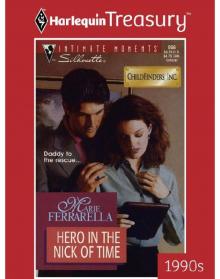 Hero in the Nick of Time
Hero in the Nick of Time![[Kate's Boys 03] - Mistletoe and Miracles Read online](http://i1.bookreadfree.com/i1/04/02/kates_boys_03_-_mistletoe_and_miracles_preview.jpg) [Kate's Boys 03] - Mistletoe and Miracles
[Kate's Boys 03] - Mistletoe and Miracles The Man Who Would Be Daddy
The Man Who Would Be Daddy Fortune's Second-Chance Cowboy
Fortune's Second-Chance Cowboy Coming Home for Christmas
Coming Home for Christmas Her Special Charm
Her Special Charm The Baby Wore a Badge
The Baby Wore a Badge Perfect Wyoming Complete Collection: Special Agent's Perfect Cover ; Rancher's Perfect Baby Rescue ; A Daughter's Perfect Secret ; Lawman's Perfect Surrender ; The Perfect Outsider ; Mercenary's Perfect Mission
Perfect Wyoming Complete Collection: Special Agent's Perfect Cover ; Rancher's Perfect Baby Rescue ; A Daughter's Perfect Secret ; Lawman's Perfect Surrender ; The Perfect Outsider ; Mercenary's Perfect Mission Montana Sheriff
Montana Sheriff Fiona And The Sexy Stranger
Fiona And The Sexy Stranger Military Man
Military Man Dating for Two (Matchmaking Mamas)
Dating for Two (Matchmaking Mamas) Cavanaugh Encounter
Cavanaugh Encounter In His Protective Custody
In His Protective Custody A Small Town Thanksgiving
A Small Town Thanksgiving Wanted: Husband, Will Train
Wanted: Husband, Will Train Suddenly...Marriage!
Suddenly...Marriage! Plain Jane and the Playboy
Plain Jane and the Playboy Private Justice
Private Justice The Strong Silent Type
The Strong Silent Type Christmas Cowboy Duet
Christmas Cowboy Duet Flash and Fire
Flash and Fire Colton by Marriage
Colton by Marriage Fortune's Valentine Bride
Fortune's Valentine Bride Mr. Hall Takes a Bride
Mr. Hall Takes a Bride Her Good Fortune
Her Good Fortune The Disenchanted Duke
The Disenchanted Duke Beauty and the Baby
Beauty and the Baby Cavanaugh Vanguard
Cavanaugh Vanguard In Bed with the Badge
In Bed with the Badge My Phony Valentine
My Phony Valentine The Rancher and the Baby
The Rancher and the Baby Immovable Objects
Immovable Objects Cavanaugh Reunion
Cavanaugh Reunion Wife in the Mail
Wife in the Mail A Hero in Her Eyes
A Hero in Her Eyes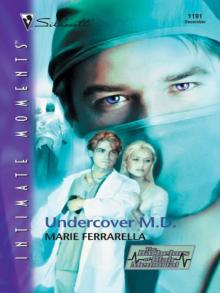 Undercover M.D.
Undercover M.D. Colton Undercover
Colton Undercover Found: His Perfect Wife
Found: His Perfect Wife Dr. Forget-Me-Not (Matchmaking Mamas)
Dr. Forget-Me-Not (Matchmaking Mamas) Loving the Right Brother
Loving the Right Brother Holiday in a Stetson: The Sheriff Who Found ChristmasA Rancho Diablo Christmas
Holiday in a Stetson: The Sheriff Who Found ChristmasA Rancho Diablo Christmas Colton Baby Rescue
Colton Baby Rescue Baby's First Christmas
Baby's First Christmas LASSOED BY FORTUNE
LASSOED BY FORTUNE The M.D. Meets His Match
The M.D. Meets His Match A Baby for Christmas
A Baby for Christmas His Forever Valentine
His Forever Valentine The Inheritance
The Inheritance The Woman Who Wasn't There
The Woman Who Wasn't There![[Kate's Boys 05] - A Lawman for Christmas Read online](http://i1.bookreadfree.com/i2/04/09/kates_boys_05_-_a_lawman_for_christmas_preview.jpg) [Kate's Boys 05] - A Lawman for Christmas
[Kate's Boys 05] - A Lawman for Christmas Husbands and Other Strangers
Husbands and Other Strangers A Match for Morgan
A Match for Morgan The Doctor's Guardian & Tempted By His Target
The Doctor's Guardian & Tempted By His Target The Offer She Couldn't Refuse
The Offer She Couldn't Refuse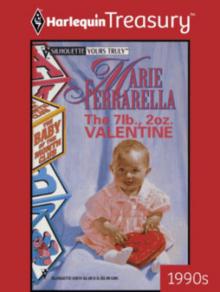 The 7 Lb., 2 Oz. Valentine
The 7 Lb., 2 Oz. Valentine Fixed Up with Mr. Right?
Fixed Up with Mr. Right?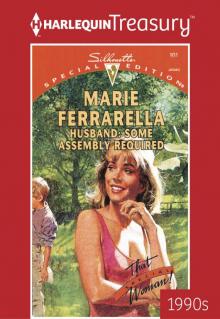 Husband: Some Assembly Required
Husband: Some Assembly Required Adding Up to Family
Adding Up to Family Cavanaugh or Death
Cavanaugh or Death Unwrapping the Playboy
Unwrapping the Playboy Becoming a Cavanaugh
Becoming a Cavanaugh Racing Against Time
Racing Against Time Christmastime Courtship
Christmastime Courtship A Billionaire and a Baby
A Billionaire and a Baby Ten Years Later...
Ten Years Later... Cavanaugh on Duty
Cavanaugh on Duty Cavanaugh Hero
Cavanaugh Hero Finding Happily-Ever-After
Finding Happily-Ever-After The Prodigal M.D. Returns
The Prodigal M.D. Returns Mendoza's Secret Fortune (The Fortunes of Texas: Cowboy Country)
Mendoza's Secret Fortune (The Fortunes of Texas: Cowboy Country) Once Upon a Matchmaker
Once Upon a Matchmaker Diamond in the Ruff (Matchmaking Mamas Book 13)
Diamond in the Ruff (Matchmaking Mamas Book 13) Fortune's Just Desserts
Fortune's Just Desserts![[Kate's Boys 02] - The Bride With No Name Read online](http://i1.bookreadfree.com/i2/04/10/kates_boys_02_-_the_bride_with_no_name_preview.jpg) [Kate's Boys 02] - The Bride With No Name
[Kate's Boys 02] - The Bride With No Name The Agent's Secret Baby
The Agent's Secret Baby Doctoring the Single Dad
Doctoring the Single Dad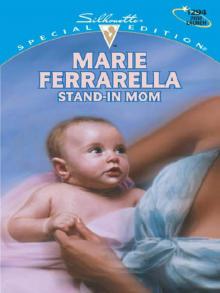 Stand-In Mom
Stand-In Mom Diamonds and Deceptions
Diamonds and Deceptions The Bride Wore Blue Jeans
The Bride Wore Blue Jeans The Amnesiac Bride
The Amnesiac Bride Cavanaugh's Bodyguard
Cavanaugh's Bodyguard Brooding Angel
Brooding Angel The Once and Future Father
The Once and Future Father Cavanaugh in the Rough
Cavanaugh in the Rough Mother in Training
Mother in Training She’s Having a Baby
She’s Having a Baby Never Too Late For Love
Never Too Late For Love Callaghan's Way
Callaghan's Way Happy New Year--Baby!
Happy New Year--Baby! Diagnosis: Danger
Diagnosis: Danger Your Baby Or Mine?
Your Baby Or Mine? The Maverick's Return
The Maverick's Return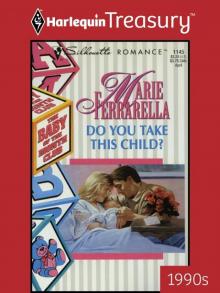 Do You Take This Child?
Do You Take This Child? The Women in Joe Sullivan's Life
The Women in Joe Sullivan's Life The Second Time Around
The Second Time Around A Hero for All Seasons
A Hero for All Seasons